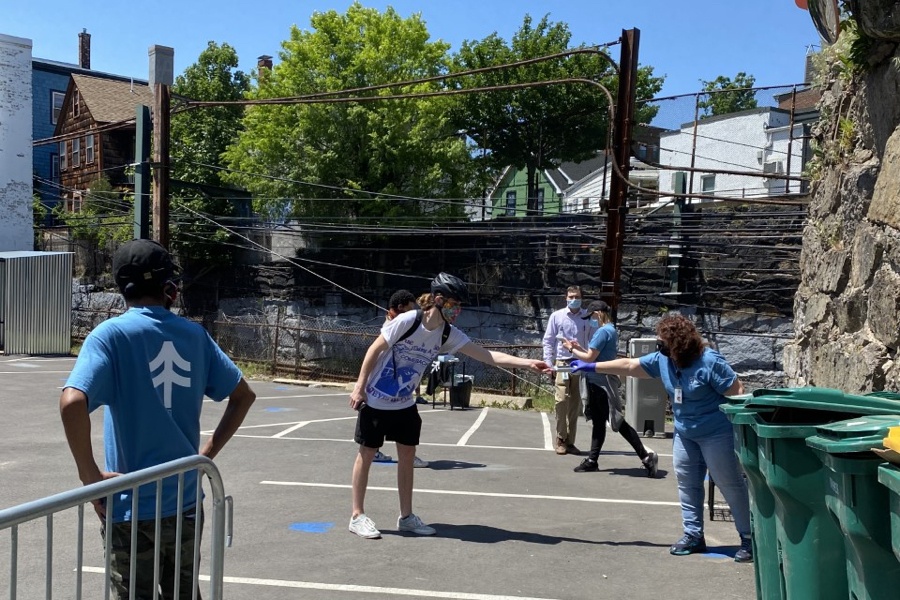Massachusetts Pot Shops Won’t Look or Feel the Same, but They’re Back
Legal adult-use marijuana sales resumed on Memorial Day, but it'll be a while before the industry is back to normal.

Staff at NETA in Brookline are practicing social distancing while filling orders in the shop’s parking lot. Photo provided.
For the first time in more than two months, non-medical marijuana changed hands legally in Massachusetts on Monday, bringing to an end a contentious, pandemic-induced moratorium that brought the state’s cannabis industry to a halt.
The vibe is very different at the dozens of adult-use dispensaries that resumed operations on Memorial Day, as each will now have to follow strict new safety and social distancing procedures—and take their business outside.
For Dorchester’s Pure Oasis, the first adult-use shop to open in Boston, it’s been “a rollercoaster of emotions,” says co-owner Kobie Evans. After a high-profile opening ceremony on Blue Hill Ave back in March, the shop was allowed to remain open for fewer than two weeks before the COVID crisis hit. “It was our civic responsibility to try to flatten the curve and that meant closing, so we didn’t take it personally,” Evans says. “But now being open and trying to recreate some semblance of normalcy is a slow process, but we’re happy to at least be part of the conversation, and working toward our goals.”
Gone for now are the days of browsing display cases or chatting up sales clerks to make purchases: In order to follow state guidelines, shops are allowed to hand over products via curbside pickup, either on foot or through a car window. To reduce crowding, customers will need to place orders in advance, arrive at a specified time, and wait in queues spaced safely apart before picking up their products.
‘Pure Oasis’ in pure bliss, as dozens of customers line up outside its Dorchester location. Boston’s 1st pot shop was closed for 2mths, after Gov. Baker ordered nonessential businesses to close. Under reopening plan, pot shops are allowed to open, but with restrictions. @Wbz pic.twitter.com/FWWrHFS6sD
— Tashanea@wbz (@TSWHITLOW) May 25, 2020
Things have been busy at Pure Oasis over the past two days, as its 30 staff members—all of whom are now back to work—have been adjusting to the new protocols and learning how to use new software. “It’s been a work in progress. Yesterday was interesting, but by the afternoon we had a lot of the kinks worked out, and today we’re doing a lot better,” Evans says. “This is all new for us.”
The chance to do business again, even with sometimes cumbersome safety protocols, is what the cannabis community has sought from the beginning of the shutdown. While medical sales of marijuana were deemed essential and allowed to continue during the first stay-at-home edicts from the governor, adult-use shops were left out. It was a state of affairs that felt deeply unfair to pot shop owners, especially when restaurants, and even liquor stores, were allowed to remain open. The situation left recreational marijuana shops in an especially difficult jam because they’re not eligible for federal relief. But Baker refused to budge. Marijuana groups sued to force his hand, but that effort was unsuccessful.
Still, although they’re relieved to be reopening their doors, pot shops say they’re serving just a fraction of the customers they did before the state-mandated shutdown. Both Boston’s Pure Oasis and NETA, which is based in Brookline and Northampton, estimate sales are at about a quarter of pre-COVID levels.
“We will continue to monitor that number and add more slots as the operation permits, but right now we’re really just planning conservatively so that we can ensure safety. That’s gonna be really, really key for us. We want to make sure that when our customers come back, and our staff come back to work, that they feel safe,” says NETA President Amanda Rositano. “Quite frankly we would like to get back to the regular volume of customers we were seeing. It’s not enough [to sustain the business long term], but we understand the restrictions and we’re just grateful to have the opportunity to be open right now. … It’s gonna be a slow roll back, and we’re not alone in that.”
More promising days lay ahead. In the second phase of Massachusetts’ reopening efforts, which can begin as early as June 8, customers in dispensaries and other retail stores will be allowed to browse and shop indoors, albeit at reduced capacity, which should help streamline the purchasing process.
Some in the cannabis business will also soon have another option: Beginning on Thursday, the state’s Cannabis Control Commission will begin accepting applications for third-party delivery licenses, which will allow businesses to bring cannabis directly to consumers’ doors. For the first two years, the licenses will be available only to applicants who meet the state’s social equity and economic empowerment criteria.
Commissioner Shaleen Title, who has advocated for the licenses, says she’s looking forward to the day when customers can have their marijuana products be dropped off like GrubHub orders—especially now. “We have implemented procedures for social distancing, hygiene protocols, and curbside pickup into retail sales,” she says. “But needless to say, and as noted in the Department of Public Health’s ‘Safer at Home’ advisory, it’s safer for everyone to stay home except for certain limited activities. When delivery of cannabis to adult consumers begins, it will allow more people to stay home and stay safe.”
In the meantime, Massachusetts’ dormant pot industry is slowly beginning to come back to life and, says Rositano. “It feels great to be here for our customers again.”

